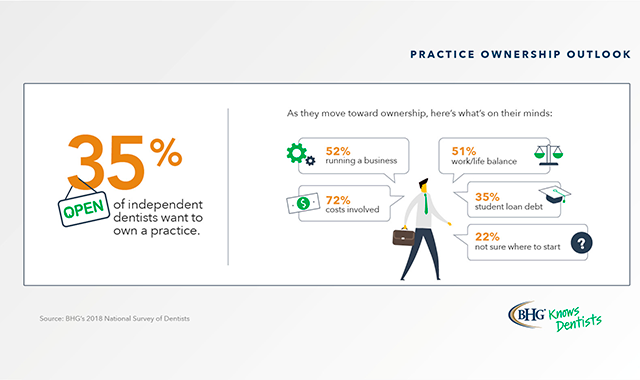Survey shows one-third of independent dentists aspire to own a practice
Among those who desire to own a practice, more than half expect to take on ownership within the next five years.

About one-third (35 percent) of independent dental professionals surveyed said they want to own a practice, according to a national research study from Bankers Healthcare Group, a leading provider of financial solutions for healthcare professionals.
Ownership can be a natural transition for a young dentist working as an associate in a practice, and two-third of dentists under age 35 said they’re involved in an ownership transition model in order to one day obtain the practice at which they work.
Among those who desire to own a practice, more than half of those surveyed (53 percent) expect to take on ownership within the next five years, while roughly one-third (28 percent) forecast ownership within six to eight years. As they move toward ownership, here’s what they said they’re thinking about:
Read more: Survey shows dentists concerned about declining reimbursement rates
- 72 percent cost involved
- 52 percent concerns about running a business
- 51 percent effect on work/life balance
- 35 percent student loan debt
- 22 percent not sure where to start

“It’s exciting to see the desire for dental practice ownership. Certainly, it’s a big investment of both time and money, but an important step in one’s career that can reap great rewards,” said Al Crawford, co-founder, chairman and CEO of BHG. “Clearly preparation is required, and by having a timeline to achieve the goal of ownership, dentists can use that time to secure the right financing, tackle other outstanding debt, and learn about what’s required to run their own practice.”
The dentists who indicated they wanted to remain independent cited the following reasons:
- 35 percent I’m happy at my current employer
- 28 percent financial implications
- 21 percent too much responsibility
- 19 percent current industry environment
- 19 percent previously owned a practice and sold it
BHG’s National Survey of Dentists examines financial concerns, business outlook and social media use across dental specialties in the United States. BHG surveyed 413 dental professionals (practice owners and independent providers) to gain understanding of their concerns and goals within their profession. To learn more about how BHG works with dentists, please visit www.bankershealthcaregroup.com/dentists.
How Dentists Can Help Patients Navigate Unforeseen Dental Care
December 12th 2024Practices must equip patients with treatment information and discuss potential financing options before unexpected dental treatments become too big of an obstacle and to help them avoid the risk of more costly and invasive procedures in the future.